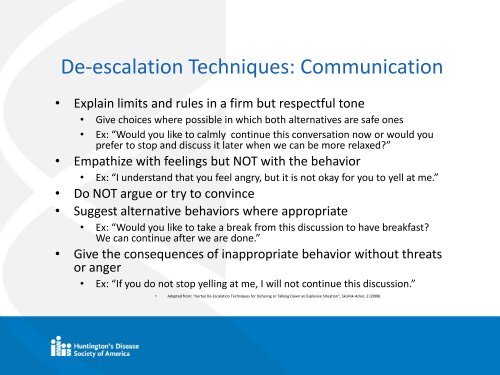De-escalation Strategies for Crisis Situations
De-escalation Strategies for Crisis Situations
De-escalation Strategies for Crisis Situations
Create successful ePaper yourself
Turn your PDF publications into a flip-book with our unique Google optimized e-Paper software.
<strong>De</strong>-<strong>escalation</strong> Techniques: Communication<br />
• Explain limits and rules in a firm but respectful tone<br />
• Give choices where possible in which both alternatives are safe ones<br />
• Ex: “Would you like to calmly continue this conversation now or would you<br />
prefer to stop and discuss it later when we can be more relaxed?”<br />
• Empathize with feelings but NOT with the behavior<br />
• Ex: “I understand that you feel angry, but it is not okay <strong>for</strong> you to yell at me.”<br />
• Do NOT argue or try to convince<br />
• Suggest alternative behaviors where appropriate<br />
• Ex: “Would you like to take a break from this discussion to have breakfast?<br />
We can continue after we are done.”<br />
• Give the consequences of inappropriate behavior without threats<br />
or anger<br />
• Ex: “If you do not stop yelling at me, I will not continue this discussion.”<br />
• Adapted from: “Verbal <strong>De</strong>-Escalation Techniques <strong>for</strong> <strong>De</strong>fusing or Talking Down an Explosive Situation”, Skolnik-Acker, E (2008)

















